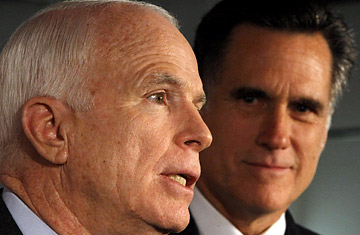
Former Republican presidential hopeful Mitt Romney, right, looks on as Republican presidential hopeful Sen. John McCain speaks during a news conference in Boston.
When Mitt Romney stepped forward to announce his endorsement of former rival John McCain, the former Massachusetts governor started out with a playful understatement: "This isn't my first joint appearance with Senator John McCain, but it promises to be one of our more pleasant exchanges." Funny, as they say, because it's true.
The acrimony between McCain and Romney on the trail was public and bitter and went far beyond the kind of traditional competitive spirit that always fuels campaigns. McCain aides referred to Romney as "Damien" (after the anti-Christ in the Omen movies); Romney himself arguably went a step further, saying that "on many issues," McCain was "indistinguishable from Hillary Clinton." In the darkest days of the McCain campaign, staffers would cite "stopping Romney" as the thought that kept them motivated. Even on Valentine's Day, the two looked like anything but newfound friends, appearing visibly stiff and uncomfortable on the same stage. Still, on the surface differences were brushed aside in favor of party unity, and McCain aides joked that they had a new reason to get up in the morning: Barack Obama.
But Thursday's press conference was less a message about beginning the general election than it was about ending the primary campaign. Romney aides said that party unity was the main motivation for the endorsement which came with a plea for Romney delegates to support McCain as well. Asked if the move was a message to Mike Huckabee, whose continued candidacy is a nagging reminder of McCain's unpopularity with some of the party's conservative base, a Romney staffer repeated that the governor acted out of a desire to solidify the nomination; he added that he hoped Huckabee was watching. (If he was he obviously didn't get the message; after the endorsement, the upstart candidate issued a statement, saying "This goes to show there is a lot of 'me too' going on in the party, I just happen to be the leader of the 'not me' crowd. There are those from the Beltway and those of the party establishment who believe it's time for the Republican Party to pull together, but there are still a lot of voices that have not been heard.")
Should Romney's delegates follow their former candidate's wishes, McCain will soon pass the magic mark that Huckabee reminds reporters of every time he's asked to justify his presence in the race: "The nomination is not secured until somebody has 1,191 delegates." However, state party rules vary — Romney's "pledged" delegates don't have to vote for McCain no matter what Romney says. Still, the move makes Huckabee's wild card bid all the more implausible. The McCain campaign is confident that with no other options even imaginable, Republicans will quickly coalesce around McCain; they're so confident that they call the conventional wisdom that McCain must somehow make a gesture to show that he is a true conservative a "Beltway myth".
McCain staffers are obviously eager to begin focusing on Obama. They dismiss the idea that McCain's more favorable matchup is against Hillary Clinton, even though that is what recent polls suggest (he beats Clinton by an average of about a point, and loses to Obama by around four). One senior adviser frames it this way: Clinton's legacy of partisan bickering makes Obama look like someone who's above politics, but McCain's history of "true" bipartisanship will reveal Obama to be an unelectable "orthodox liberal." Says the adviser, "What has Obama done? Show me a single issue or piece of legislation where Obama has done something politically unpopular in order to move forward toward a greater goal."
The McCain campaign got a chance to preview this strategy today as well. Recalling Obama's early 2007 "deal" to accept public financing for his campaign should McCain also agree to it, campaign manager Rick Davis told reporters that he wouldn't be surprised if Obama "rethought" the idea. Public financing limits campaign spending to $85 million; given Obama's extraordinary fund-raising success beyond that in the primary, said Davis, "I think there is a more likely chance he'd break his pledge than John [would]." The shot prompted Obama spokesman Bill Burton to characterize the supposed "deal" between McCain and Obama to accept public financing as an "option," rather than a pledge — though it had originally been characterized in the New York Times as "the fund-raising truce." The salvo had echoes of the many bruising flip-flop attacks McCain had thrown Romney's way only a couple of weeks ago — though clearly the new battle, whether against Obama or Hillary Clinton, will not end in an endorsement.
